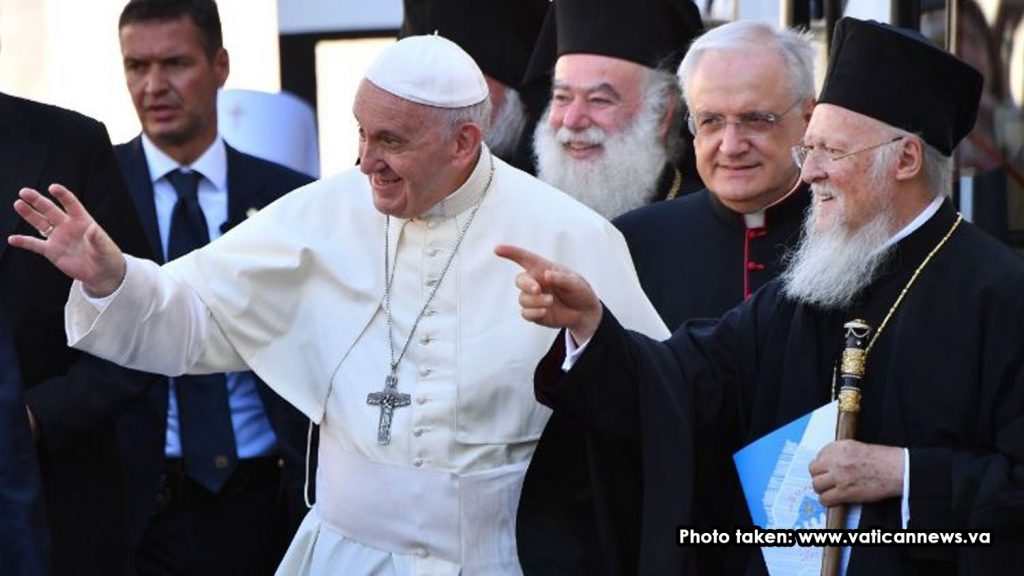
Pope Francis and other Christian leaders during a Ecumenical Prayer for Peace event in Bari (AFP or licensors)
Often the Silsilah Dialogue Movement presents the call to interreligious dialogue among Muslims and Christians promoting the Culture of Dialogue as a Path to Peace. This is, indeed, one of the signs of the times, especially in Mindanao, but we cannot forget that the spirit of the Culture of Dialogue is not only focusing on the interreligious dialogue, but in all forms of dialogue, starting from the family, the society and all aspects of life. It is a spirituality that we call spirituality of life-in-dialogue. In this Oasis News, we give special attention to a form of dialogue normally called, “Ecumenism”.
Ecumenism refers to Christians of different church traditions to develop close relationship and understanding. The term is also often used to refer to efforts towards the visible and the organic unity of different Christian churches in some forms.
This week (January 18-25) around the world, Christians pray for unity. It is an annual ecumenical celebration. Christians around the world are invited to pray for the unity of all Christians, to reflect on scripture together, to participate in jointly-organized ecumenical services, and to share fellowship.
In the northern hemisphere, the Week of Prayer for Christian Unity is traditionally held every year between January 18th (the Feast of the Confession of Saint Peter) and January 25th (the Feast of the Conversion of Saint Paul). In the southern hemisphere, it is often celebrated during the Pentecost season.
In the Gospel of John, Christ prays for his disciples before going to the cross. He asks that his followers “may all be one,” as he and the Father are one, “so that the world may believe” and have life in his name (John 17). Christian unity is here made central to the very being of the church and to its mission and witness. The worldwide celebration of the Week of Prayer for Christian Unity is both the seed and the fruit of this striving for ‘unity in diversity’. This time of shared prayer, reflection, and fellowship invites Christians of different traditions to deepen our relationships and to live and witness together throughout the year.
This special week started in the Roman Catholic Church in 1908, but along the years have been spread around the world. Ecumenism and interreligious dialogue, basically, is different because it refers to different kinds of dialogue, but the spirit of dialogue is the same. We can also add that Ecumenism can challenge our mission of interreligious dialogue and vice versa. Indeed, if the Christians are divided it is difficult to encourage people of other religions to dialogue with the Christians. The same problem can be identified among Muslims which are also divided in different groups.
Guided by this understanding, the call to dialogue among Christians with people of other religions is a must and become a “dream”, but a dream becomes a reality when many dream together and move with the same spirit. For this reason, Silsilah in this occasion of the week of prayer of the Christians invite all, Christians and Muslims and people of other living faiths, to build together the Culture of Dialogue as Path to Peace and harmony among people of different religions of the world. This celebration, by coincidence, can be a good preparation for the Christian groups to prepare spirituality the World Interfaith Harmony Week that will be celebrated soon (February 1-7).
Since the founding of the World Council of Churches in 1948, many other Christian denominations around the world have come to celebrate the Week of Prayer for Christian Unity, and since 1968, the Faith and Order Commission of the WCC and the Pontifical Council for Promoting Christian Unity have collaborated to produce materials for use over this eight-day period. May this special week of prayer help us to promote the Week of Prayer for Christian Unity especially now that Christians in the Philippines are moving toward the celebration of the 500 years of Christianity on 2021.

